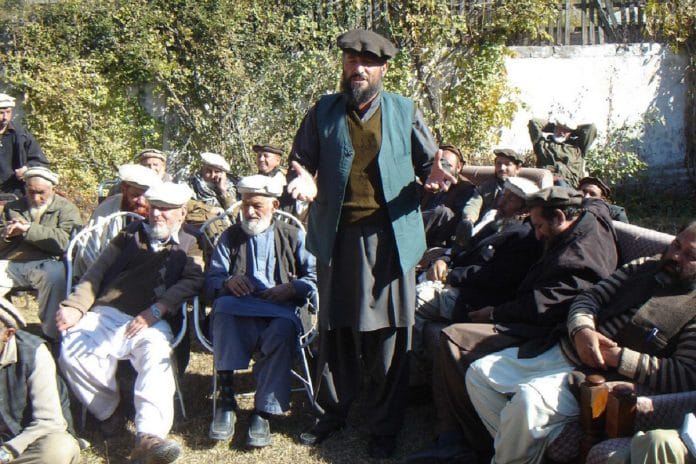New Delhi: Barely weeks after the Pakistan government announced plans to revive a medieval justice system in certain pockets of the country, a chilling video of a so-called honour killing has outraged rights activists. The killing was sanctioned by a jirga council in Balochistan’s Quetta after a man and a woman belonging to two different tribes married.
The execution-style killing of Bano Bibi and Ehsan Ullah in May was captured on video and was circulated online last week.
The video from Quetta shows the couple being executed for marrying without the consent of the bride’s family. The footage shows the woman holding a Quran and asking the man to walk seven steps with her before being shot.
“You are allowed only to shoot me. Nothing more than that,” she is heard saying before being gunned down. The man was shot multiple times alongside her.
The killings have raised questions around institutional complicity, lack of enforcement, and the government’s intent to revive a deeply flawed system.
Farzana Bari, a leading voice in Pakistan’s women’s rights movement, pointed to the historic resistance to jirgas (a council of elders).
“We have always been against parallel judicial systems. The Jirga Panchayats dominate with a clear gender bias. The Supreme Court has declared them illegal, yet they continue to operate and issue death orders,” she told ThePrint.
Bari referred to the infamous Kohistan video case where the girls seen dancing were later killed on jirga orders. “We do not have a monitoring system in the local government to act against these councils. Until action is taken, we will keep seeing these bone-chilling incidents. Every Pakistani is deeply shaken by the video,” she added.
The right to kill
At least 13 people, including a tribal chief, have been arrested in connection with the case, Dawn reported. Police say the killings took place in May on the outskirts of Quetta and were ordered by a local jirga as punishment for the couple’s alleged relationship.
A local court has ordered the exhumation of the dead bodies for autopsy. Police reported that the woman’s brother carried out the killing under orders from tribal leader Sher Baz Satakzai, who has also been arrested. Balochistan Chief Minister Sarfraz Bugti condemned the act. “No one has a right, no matter what, to kill someone in such a painful and disgusting way, and then video shoot it. It is a crime. It is a murder,” he said.
Isabelle Lassée, deputy regional director for South Asia at Amnesty International, told ThePrint that the case speaks to a larger pattern of gender-based violence in the country.
“In the last year alone, the Human Rights Commission of Pakistan reported at least 478 instances of so-called honour killings across the country, including 67 cases in Balochistan, and many more go unreported”, she said.
The case raises serious questions regarding the efficacy of authorities to address this violence.
“Even though arrests have been made in the case, it was only after a video of the killing surfaced online more than a month after the incident allegedly took place,” she added.
Also read: What’s behind Pakistan’s solar energy push—China is just one factor
The jirgas and their revival
Ironically, even as the double-murder case exposed the brutal implications of jirga justice, the federal and provincial governments in Pakistan held a high-level meeting on 2 July to discuss reviving the jirga system in the merged districts of Khyber Pakhtunkhwa. They considered bringing back jirgas to areas formerly governed under the colonial-era Frontier Crimes Regulation (FCR) before the 2018 merger of the Federally Administered Tribal Areas (FATA) with Khyber Pakhtunkhwa.
The plan is being pitched as a means to “promote an effective alternative justice system” and ensure “development and maintenance of law and order in tribal districts.” It saw resistance from activists and analysts alike.
Meanwhile, the Balochistan incident saw scathing national editorials that called for jirgas to be contained.
“When jirgas presume the authority to pass and execute death sentences – especially under the flawed pretext of honour – they cease to be mediators and become enforcers of cruelty. Honour killings must be treated as crimes against the state. No forgiveness agreements. No tribal settlements. No legal loopholes. Prosecution must be mandatory, and punishment severe,” an editorial in Express Tribune said.
A Dawn editorial echoed similar sentiments: “Murder for ‘honour’ is craven compliance with customs that derive sustenance from blood. The persistence of such a scourge has sparked outrage about parallel justice systems and the fragile state of women’s liberties in Pakistan. These acts should be stripped of all traditional context that valorises them.”
(Edited by Ratan Priya)







Wise step.
Kill each other off and finish yourselves.
Good riddance for us.
Maybe that’s why the idiom is “khas kam jahan PAK?”